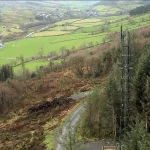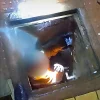Openreach Reduces Pilot for National UK Exchange Closures

Openreach (BT) has published an update on their Exchange Exit Pilot, which recognises the “resource-intensive nature” of the work for ISPs and has thus reduced the number of exchanges involved from five to three. All of this forms part of their plan to shut 4,500 exchanges, which will impact various broadband, PIA and Ethernet services.
Openreach currently runs c. 5,600 UK exchanges, but only c. 1,000 of these exchanges – the Openreach Handover Points (OHPs) – are used to provide nationwide coverage of modern “fibre broadband” based services (FTTC, FTTP and G.fast). But the rollout of full fibre, combined with the retirement of copper lines and analogue services, will eventually make it economically unviable to support both the old and new exchanges.
The operator has thus formed a long-term plan to close the vast majority of their older exchanges – known as the ‘Exchange Exit Programme‘. The aim is to conduct an initial closure of around 100 priority exchanges by 2030 (taking place between 2027 and 2030), with the rest following gradually in the years thereafter. But before that, the operator has been piloting their approach via an initial batch of just 5 exchanges.
Advertisement
The initial pilot, which began in May 2022 (here), involved five “child exchanges” that Openreach aimed to switch-off in 2024-25 – including Deddington, Carrickfergus, Ballyclare, Glengormley, and Kenton Road. But a recent industry consultation on their proposed approach (here) revealed that this was causing some headaches for providers.
“In response to CP feedback and recognising the resource-intensive nature of the five Exchange Exit pilot exchanges, we have decided to reduce the number of pilot exchanges from five to three. Carrickfergus and Glengormley will move from the Exchange Exit pilot and be repositioned into phase one of the Exchange Exit 2030 programme. Streamlining the pilot … will enable Openreach and CPs to concentrate our efforts where they are most needed, addressing challenges with greater precision.,” said Openreach.
The Revised Exchange Exit Pilot

Advertisement
We should point out that Fibre-to-the-Premises (FTTP) broadband coverage across Deddington is already effectively universal (c.99%+), while the other two locations are only a few percentage points behind and coverage is expected to improve before the complete closure. But Openreach has previously warned that they may be unable to provide FTTP to everybody (i.e. issues of prohibitively high costs and permissions/consents to cross private land etc.) and “in these scenarios, customers may need to seek an alternative provider or technology solution.”
An Openreach spokesperson told ISPreview:
“In December 2020 – we asked our Communication Provider customers for their views on plans to close 4,600 exchanges throughout the UK by the late 2030s.
Today these exchanges support traditional copper-based phone and broadband but, as we upgrade the UK from analogue copper-based services to digital fibre-based ones, many exchanges will eventually become unviable for Openreach and Communication Providers (CPs) to operate from, so closing them down is a natural next step.
We’re under no illusions that this is going to be a hugely complex programme to plan and deliver – so we formulated a plan to develop and test approaches to mass-migrating CPs customers using five pilot exchanges; in Deddington, Ballyclare, Kenton Road, Carrickfergus, and Glengormley, with product switch-off coming later next year. We are also consulting with CPs on a further 103 exchanges to be exited by 2030 (‘Exchange Exit 2030). These have some of the highest running costs so there’s a clear advantage in targeting them first.
In response to CP feedback and recognising the resource-intensive nature of both the WLR Withdrawal programme and the Exchange Exit 2030 programme, we have decided to reduce the number of pilot exchanges from five to three – allowing Openreach and CPs to address challenges with greater precision. Two of the three N.Ireland exchanges, Carrikfergus and Glengormley, will now be included in the phase one of the Exchange Exit 2030 programme.”
The operator currently envisages a gradual four-phased approach toward closure, which reflects the complexity of what they’re trying to do. The process of exiting the most complex exchanges would thus begin up to 7 years before their exit date, although the simplest exchanges could be done within 4 years.
In terms of the 4-year approach, the first 3 years would focus on encouraging voluntary migration and using “stop sells” on old products (i.e. you can’t buy them any more), while the final year would involve “supported migrations” or the risk of your service being ceased if the retail provider fails to achieve this. ISPs would also be expected to remove their kit from exchanges in the final year.
The operator is also having to grapple with the still thorny issue of Ethernet, Dark Fibre (DFX) and PIA (access to existing cable ducts and poles) solutions, which are supplied by many of the old exchanges. Alternative networks have previously warned that the costs involved with adapting to this could be significant (here) – risking their investments becoming unviable, and have called on Openreach to “shoulder a portion of the costs to its customers of accommodating” the closures. Openreach have previously said that they may be able to help in some, but perhaps not all, areas.
Advertisement
Openreach are choosing the first c. 100 exchanges based on a variety of different factors, such as FTTP coverage, location (avoiding resources contention), volume of Ethernet and optical customers served, and complexity of the exchange itself. In addition, issues of expiring leases and other cost impacts also have a role to play.
Openreach have previously said that they would prioritise exchanges where the potential benefits of exit are highest (e.g. those with very high running costs). But just to be clear, the operator will NOT be withdrawing exchanges in areas where doing so would leave lots of existing customers disconnected (i.e. no fibre or FTTC alternatives).
A total of 105 exchanges are currently expected to have been exited by December 2030.
Mark is a professional technology writer, IT consultant and computer engineer from Dorset (England), he also founded ISPreview in 1999 and enjoys analysing the latest telecoms and broadband developments. Find me on X (Twitter), Mastodon, Facebook, BlueSky, Threads.net and Linkedin.
« Government to Expand Powers of UK Internet Snooping Law






















































So if we deem it unviable to replace your copper service with FTTP you can go forth and multiply. Tough. So this is what competition looks like.
Surely if 99% can get Fibre the cost of providing Fibre to the remaining 1% cannot be that high when measured against the cost saving of closing the exchange and potentially selling he land and building
What is the issue for the ISP’s? Is it that although FTTP availability is 99% that the take up is low so a lot of resource is needed to move them to FTTP
If the above is the case should not BT be looking at moving people to FTTP automatically as a part of the Digital conversion ?
Trouble also is the areas they deem unviable to install FTTP are also likely to be the areas badly served by the mobile phone networks (for example the EE signal in Deddington is absolutely lousy). It seems there are going to be some people left with little choice but to cough up for Starlink.
Pretty certain in 2020 when exchange closures first consulted on, the number of exchanges with active PIA users would be single digits… to subsequently claim this is a costly problem and Openreach should support financials for is comical!
Unbundled operators might certainly have a greater headache – esp those whose architecture is exchange rings or daisy chained backhaul like Sky as the dependency on the smaller exchanges is much greater
I once again question the whole concept of an “alt” net if they’re so heavily reliant on Openreach to do all the hard work for them.
Openreach’s own NGA network has always been based on the concept of the larger exchanges acting as headends and the smaller exchanges essentially being cut out of the picture – so any “alt”net that planned for the continued existance of any of the latter has committed quite a dereliction of duty and it’s not for Openreach to have to save them
Yes it is. BT allowed them into their exchange in the first instance and agreed operating rules inside it regarding access and equipment…
if Openreach said “no you can’t come in, you can see that our network doesn’t originate from here & we’re thinking about closing it entirely in X years” the altnets would have gone straight to Ofcom to complain.
It’s not Openreach’s fault that the altnets failed to plan for the obvious. These companies do seem to be struggling with a lot of obviously foreseeable issues right now…
BT’s contracts with other operators will almost certainly allow them to terminate the service given appropriate notice.
I suspect that the operators who are complaining decided to take the risk that Ofcom wouldn’t let BT close any of their exchanges. Either those operators are incredibly commercially naïve or, more likely, it is an attempt to extract the maximum value from BT – why just take money from your customers when you can get the regulator to get your competitors to give it to you as well?
They’ll be a contract – an agreement made by BT. End if before that if timed duration and yes BT liable in my view. Outside of that, probably not with given notice. There may even be an exit clause subject to agreed notice period before official end of agreement.
BT have closed numerous exchange buildings in the past. The legal and contractual obligations will be well established
If BT are struggling to close a few small pilot exchanges how realistic are there timescales to close hundreds ?
I can’t get a proper internet connection keeps breaking down prommist a ff connection last Feb but still no joy
Hang on..based on Monday’s article about SOGTAP for Analogue (SOGTAP4A?), surely for the small “rump” of customers who cannot be put onto FTTP (for basic phone service or for internet), surely BT could deploy a MSAN in a cabinet(s) on the street close to where the exchange building was (or somewhere else) to keep customers who cannot get a FTTP connection alive, with phone service (SOGTAP4A or VoIP) and FTTC or ADSL (for full internet or VoIP)?
Feels like just saying “tough we will withdraw service that is now too expensive to provide” is pulling a fast one?
Or am I misundertanding this?
And surely Openreach cannot “force withdraw” basic phone service from a customer?
You are misunderstanding this.
As the article points out, at present Openreach is only “force withdrawing” service where a replacement exists. There is no indication that that policy will change in the future.
In the case of WLR3, there has been over 10 years notice which seems very reasonable. Everyone on WLR3 voice will have an equivalent replacement (give or take arguments about the provision of power, which your street cabinet solution wouldn’t solve in any event).
In the case of other services (e.g. in specific areas where ADSL and FTTC has been replaced by fibre) they are not currently withdrawing any services – if you don’t change your service you will stay on ADSL or FTTC – eventually those people with FTTC or ADSL services will be forced to fibre but I don’t see that as a big issue.
Attempting to preserve copper service when an exchange is withdrawn is likely to be as expensive as providing fibre (or FTTC) to the last few people on copper. Trying to re-patch an exchange’s worth of cables, most of which aren’t used but a tiny fraction of which are, into a street cabinet without affecting service to those at the end of the used cables would be a significant undertaking with absolutely no business case whatsoever.
The general condition rests with BT group, not openreach. As long as they can provide and alternative technology solution then yes, they can withdraw copper landlines. Customers of other CPs will need to discuss alternatives
I think its more subtle that “withdrawing service”. I feel that most of the leverage in moving people will come from the blocking of transfers. So if I had ADSL, FTTC or POTS (I don’t I have FTTP) on my street, and wanted to change ISP I am pretty much forced to move to Fibre, or Virgin, although some suppliers can still provide the old services, I believe this facility will soon be withdrawn.
My comment was based on this para from the article, reading this from the PoV of the end consumer (who won’t know or care much about WLR3 etc.)
“But Openreach has previously warned that they may be unable to provide FTTP to everybody (i.e. issues of prohibitively high costs and permissions/consents to cross private land etc.) and “in these scenarios, customers may need to seek an alternative provider or technology solution.””
And based on the text around that, it seems that any copper line services provisioned from the exchange would be converted to FTTP. But what happens to the end customer if
* Exchange is closed, triggering a final move of all remaining copper services to FTTP
* But the specific end customer/subscriber cannot be provided with FTTP because it is too expensive for Openreach to install to replace the existing copper line to provide to continue the customers current service. (And likely other providers would also find it expensive, leaving only wireless solutions for a customer that may only want voice, and may really need voice?, or is using ADSL/FTTC and is now left with no alternative?)
I’m not talking about ISP as customer, but subscribed as customer.
That’s what the article seems to say, in summary, for that point.
The regulatory answer to that question of what happens when BT want to close an exchange but there are customers who are still on ADSL or voice only and cannot economically be provided with fibre is unclear.
Note that exchange closure won’t affect FTTC so that will have its own timescales for closure, probably based solely on its replacement with FTTP.
I suspect it won’t come to service being withdrawn from people leaving them with nothing (mostly due to the political challenge of doing so). If there is really no cost effective way to replace the copper when an exchange is being closed then I suspect a VDSL or ADSL from a cabinet solution (the cabinet being somewhere within the economic FTTP footprint rather than necessarily at the exchange) would be provided. Having said that, if it is a wayleave problem then it seems unreasonable for BT to carry the burden of properties with titles which are defective to the extent that they don’t have a right to have modern utilities installed to them.
How can exchange closures not affect FTTC. The copper goes back from the cabinets to the exchange
Are they intending to divert the cables to the hand over point? Would that maker economic sense or would it be cheaper to convert all the FTTC to FTTH
FTTC is NOT affected by exchange closure.
Copper goes from the home to the original voice cabinet in the neighbourhood. From there there is a link to an associated FTTC cabinet located nearby (normally next to it). At that point the data and voice paths split. The data goes via a fibre link to a handover exchange (i.e. an exchange which will not be affected by the exchange closure programme), the voice goes back to the voice cabinet and then back to the original exchange (which may eventually be closed). Of course, in some areas the handover exchange and original voice exchange may be the same thing.
Remember that BT has already sold the exchanges and is leasing them until they exit. The property owner will then look to redevelop the site and put new buildings up. If there is a commercial demand from ISPs with kit in the exchange, they could build a small comms room into the design of the offices/flats and put a temp container on site in the interim. Messy during the redevelopment, but possible.
How can we find out which exchanges are Openreach Handover Points? Are there any maps or data available to the public? Google doesn’t seem to show up any results.
I’m on the Kenton Road exchange. Now BT have forced me to use there voip service to keep my landline running. Only reason I had a landline was for my alarm dialer now that’s not possible to operate also have to use the home hub can’t use my own router anymore!
If a property has copper connection that must travel over various land to get there. One assumes the land owners have already got wayleave arrangements for the copper.
If it needs to be changed to fibre, why wouldn’t this just be counted as a repair or upgrade to the existing infrastructure? Surely if the exchange closes and customer can’t have a service then OR are not going to continue to pay the landowner for a dead bit if cable under their field? In which case land owner loses cash income.
Better surely for there to be a mandated wayleave for upgrade and the landowner to continue to receive their payments at the same rate they do now?
I find it incredible that Deddington is a pilot – for a village of its size it has very poor mobile coverage; thus many residents will have poor (if any) communication in the case of a power cut. Are Openreach going to provide every property with significant battery back-up?
Would it make sense to roll out FTTP immediately, or as soon as possible, to properties served by the 103 exchanges they plan to exit by 2030? This would make the exchange exit run as seamlessly as possible; even if the final stage of the exit is happening in December 2030, surely starting earlier with those exchanges would be helpful. I understand that Openreach has planned for FTTP to be in place four years before the final exit date, but the sooner it is in place, the more people are likely to have transitioned by the final exit date, and the smoother the transition is likely to be.